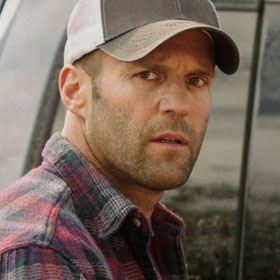'Homefront' Review: Jason Statham And James Franco Thrill In This Underwhelming Action Flick

3/5
Homefront, the newest Jason Statham vehicle, is full of the heart-stopping fist fights Statham is known for, but adds a twist to the genre by adding in a mix of fully formed secondary characters and villains.
Homefront marks the newest attempt by James Franco to invade genres and inhabit characters you’d never expect. As Gator, Franco takes on the role of a local meth dealer in a small town, who goes up against Statham’s ex-super spy Phil Broker. Unlike his role in Spring Breakers, Gator isn’t a parody of a small-town drug dealer – he’s the real deal, faults and all. Gator’s low-I.Q. and violent ambition, paired with Franco’s menacing stare makes him a perfect foe to Statham’s loving, if a bit overprotective, father, Phil.
After Phil’s wife died, he quit is job as a badass undercover agent and moved his ten or twelve year-old daughter to a small, secluded town. When his daughter, Maddy (Izabela Vidovic), beats up the local bully, Phil is thrown in the crosshairs of the bully’s meth-addicted mother Cassie (Kate Bosworth). When Phil beats up Cassie’s husband in the school parking lot after a failed confrontation, Cassie goes straight to her brother, Gator, and asks him to get even. From there, the film, adapted from a novel by Chuck Logan, gets in over its head plot-wise, adding a gang of bikers who want revenge on Phil from his days working for the DEA and an out of place flirtation with Maddy’s school therapist, Susan, played by Rachelle Lefevre. These oddities bothered me for two very, very different reasons: the first was simply too coincidental (Gator’s sometimes girlfriend just happens to have a past with the gang that wants Phil dead) and the second was just plain stupid – Lefevre’s job seemed to consist of her looking pretty – and the character/love interest only served to show the audience that Phil needed not to runaway from his problems because he had a real shot at life here (cue the tears?). Because the film never really explored their connection, a possible romance with Susan didn’t feel like a strong enough reason for Phil to bunker down.
The screenplay, written by Sylvester Stallone, felt very much like a first draft. Crucial and interesting scenes were followed by expository sentimental exchanges that lost the thread of the story and there were too many plot holes that were either skimmed over or patched over with coincidences. In Stallone’s effort to keep the character of Phil a mysterious badass type, the film lost the sense of its protagonist. The audience gets snippets here and there of Phil’s past (the tragedy of his dead wife), but gives no details, which leaves it devoid of meaning. The film opens on Phil’s supposedly final bust with the biker gang after being undercover for who knows how long. Suddenly, two years later, he has a pre-teen daughter, leaving me with a whole host of questions. How did he maintain a marriage? How could he possibly have been around at home enough to have such a close relationship with his daughter?
The writing not only failed to paint a clear picture of Phil, but it also built a story from convoluted plot connections that felt far-fetched at best, lazy at worst. Director Gary Fleder did his best with what he had, adding in interesting jump cuts to transition between scenes, which also served to add a bit of dimensions to secondary characters, Gator and Cassie. Fleder, whose recent directing career has consisted mostly of hour-long television shows, overcompensates for the writing in an attempt to bring Phil’s internal conflict to life. Every shot of Phil and his daughter in the woods or in their home is shot with an idyllic sensibility: soft lighting, bright, vibrant colors and a soft focus make them appear like a dream. Yes, the scenes are beautiful, but, after the first few scenes, it gets repetitive, and the sweeping, emotional music does nothing to help. The music is so painfully obvious, it’s only effect is to make the audience roll their eyes and hope against hope that it will soon die down and fade into nothingness.
The film survives on its stars. As always, Statham’s charm and action skills are more than enough to carry the film, but the added element of fatherhood allows him to show a more restrained side to audiences. It’s interesting to see Statham, a man audiences know as someone that can take care of himself, play a father who must reign in his aggression in front of his daughter. It’s sweet and adds a new facet to Statham’s tough but non-threatening charisma as a leading man.
The supporting cast and characters, minus a frivolous Susan, is wonderful. Bosworth, in particular, stunned as a tough, damaged, drug-addicted mother. I was captivated every second she was on screen. Playing a junkie is something that can easily feel over-done. The shakes, the frantic movements, can all seem false, but Bosworth’s every move was natural and seamlessly folded into the next. The more we learned about her (her relationship with her brother, drugs, and her identity as a mother), the more I wanted to know. Franco was equally enjoyable, and his scenes with Bosworth were, by far, the most riveting scenes in the film aside from those he shared with Statham.
Homefront is a fun, solid action film, and, I can’t say this enough, Statham is thoroughly enjoyable to watch and root for, but I almost wish I had seen a movie about Gator (Franco) and Cassie (Bosworth) instead.
RELATED ARTICLES
Get the most-revealing celebrity conversations with the uInterview podcast!








Leave a comment